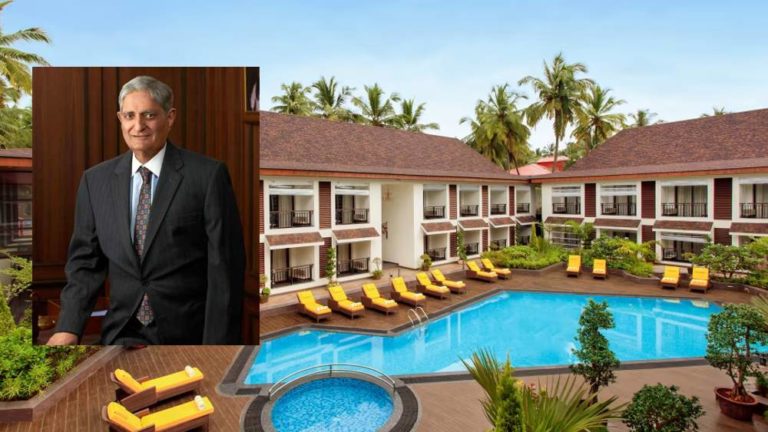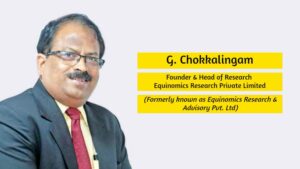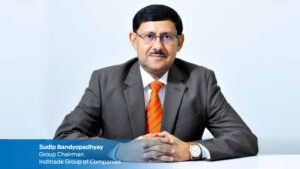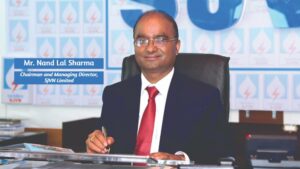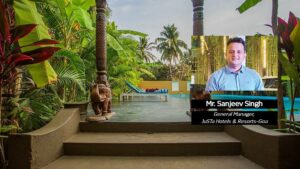“The Thrill of Running the Show Keeps Me Moving”
A veteran in the hospitality industry, Mr. Anil Madhok, Executive Chairman, Sarovar Hotels & Resorts leads from the front because he has always been at the front. Starting his career with Oberoi Group way back in 1966, he also had overseas stints in Sri Lanka and Singapore. But a chance meeting with a gentleman drilled in him an entrepreneurial streak that fueled his dream of having something of his own. The result was he left the cushion of a secure job. Having seen it all, done it all he was not wary of failure.
In 1994, he founded Sarovar Hotels. The tree is now big with a network of 97 hotels, not just in India but also in Africa. Sarovar has four existing brands – Sarovar Premiere, Sarovar Portico, Golden Tulip, and Hometel – these self-explanatory names indicate the services.
A die-hard optimist with a twinkle in his eyes Mr. Anil Madhok, spoke with Indian Economy & Market about his journey, his future plans, Covid, and its impact in detail.
There are a lot of disruptions happening in these critical times. The hospitality sector is sadly the worst affected. Your take?
Hospitality was affected very badly but now it’s coming out of it slowly. Domestic traffic has picked up a lot but foreign traffic is still not coming. So occupancy level has moved up but rates are less. Unless the company travel starts and the foreign travel comes your room rates wouldn’t go up. But it is not as bad as we were one time. Last few months it is gradually picking up. It is hard to predict when normalcy will come back as long as the restrictions are not lifted up. At the moment hotels are all full of domestic customers. It also depends on people’s perception – whether India is safe and the policies of airlines. Domestic travel is ok but right now international travel is difficult. Business travel has started but very little.
What is the current status of the Indian hospitality sector on the demand and supply front?
Indian leisure travel is better than ever as people were fed up for two years and coming out in a big way. One may call it revenge tourism but hotels in Kashmir, Shimla, Agra, Mussoorie, and Goa are doing very well. Everyone is tired of sitting at home. I think when everything gets normal there will be stress on supply. There would be a lot of demand. India is a huge country. Mark the number of people coming in so the overall situation would improve gradually. I am very optimistic that the hotel industry will do very well. Demand and Supply are cycles industries always go through. When the crunch comes everybody starts to build and when there is a slowdown nobody wants to build. It is a leveling thing that happens on an ongoing basis.
Please tell us about the journey of the company so far?
I started the company in 1993-94. Before that, I was with Oberoi for 25 years. Today we have 97 hotels in India and overseas and out of that only 3 are not functioning. Rest all are open following Covid protocol very strictly. Outside we’re only in Africa since we find enough growth possibilities here itself. I find India is suddenly booming. Also, I feel people who thought they could run their own hotels have realized during Covid the difficulty without a chain application. So we found suddenly new sign-on and have 42 more projects in the pipeline.
How many do you own?
We only own two – Hometel Chandigarh and Hometel Roorkee; Portico in Chennai is under construction and will take another two years to open. Others all are managed. Building a hotel takes 2-3 years and it’s a very cumbersome job. That is the reason most large companies don’t own. Even Taj has announced now that they are not going to build anymore. The financing, approval, and building part are done by the owner. If you want to grow an organization then the international practice is to go asset-light. When Covid came the owners were in trouble since there was no revenue, yet they had to pay back the loan. A few months were really bad. But we’re in a lot of small towns like Gorakhpur where the business has been good.
You must have seen so many cycles in your career?
Yes, I’ve gone through this phase many times. I have observed the sector for 55 years. When in 1982 Commonwealth Games was organized Delhi built a lot of hotels as Delhi came big on the tourist map. So during 1982-86, there was a massive boom. In 1986, came the Bofors Scam and everything went off. It created a huge crisis and the hotel business went down substantially. For five years business was slow.
Again in 1991 when the then Prime Minister Narasimha Rao with his then Finance Minister Manmohan Singh initiated the process of liberalization things changed and rates moved up. But in 1994 the business just crashed and the slowdown lasted till 1997. So these things have been coming up but not on as big a scale as this time. Covid has wiped out the momentum from the whole world.
As a veteran in the sector, what do you expect from the government?
We have a Hotel Association of India (HAI) and our people had been having a lot of meetings but nothing has come out of it. In the last 55 years, I have never seen the government ever take tourism seriously. The industry has a lot of issues. Infrastructure, taxation, loans, etc. are the main issues. You need a long-term loan but we are not treated as an industry. Approvals can take a lot of time according to states. Some are very co-operating like Karnataka, AP, Telangana, Rajasthan, and Delhi but some states will make you run around a lot. Safety is also a concern.
Having said that I think at present we are seeing the second phase of reform indeed happening. Civil aviation has brought a sea change. Earlier you couldn’t get out of India. Today you have multiple choices. Prime Minister Narendra Modi is really carrying out the second phase of liberalization. Suddenly the decision making has become very fast and they are opening up sectors which are the only sensible thing because the government can’t run business. Earlier privatization was a dirty word. I am not sure how far it is true but I read Air India was losing 20 crores a day. If it is true why did they delay so long to sell it?
What strategy you are going to adopt after the Covid crisis gets over?
Our strategy remains the same – we need to grow and open more hotels. We are in the process of expanding our reach and adding more where we already have our presence like we are adding Model Town Delhi, Dibrugarh, Katra, Indore, Gurgaon, Igatpuri, Sonipat, Srinagar, Amritsar, Jalandhar, Dwarka, Goa, and Latur. In Lucknow, we are opening 104 room hotels. I think we have a lot of potential in India so we could still explore India in a big way. If you really go state by the state you have a lot of potential. That was not the case 20-30 years ago. Smaller cities’ hotels didn’t do well.
When I started the company a lot of people told me you have to go to a big market. But my aim was to focus and tap the mid-market because abroad wherever I went I saw mid-market hotels in about 1 to 10 ratio with the luxury. My thinking was and is that more people can afford the mid-market and fewer people can afford the luxury. We are in the mid-market and there is no chain of our size in the mid-market.
The idea germinated when in 1994 I read an article that the government was targeting 200 billion worth of exports. Now to do that you will have to start producing into the interiors. That means you need roads, transport to ports cities, and build a port to ship it out. That’s what right now we are doing and in the process, lots of cities are becoming economically viable. People are setting up factories in smaller cities which in turn are creating huge potential. Earlier nobody wanted to look at the mid-market. Now big chains also are moving to mid-markets.
In your opinion what makes Sarovar different?
First, we have a very good network in smaller towns and that helps us to capture the market. Earlier no one was coming but now a lot of senior people coming to mid towns. Second, we don’t have any loans and are completely debt-free. Third, we have hotels and restaurants but we also are into institutional catering. There are 12 institutions where we do catering, housekeeping, engineering, etc. Some of the prominent names are ISB Hyderabad, Chandigarh, IIM Ahmedabad, and Kolkata. In this list is HUL also.
When did you decide to start your own chain of hotels?
I was in Singapore when the president of Disney World came with his wife. They were on a world tour, a parting gift they had received from the company on retirement. He said that he used to work for Oberoi way back in India before joining Disney. Then he told me something that changed my way of thinking. He said a hotelier’s life is very deceptive. If you snap a finger you will have a party for 100 people. You entertain the highest level of people lavishly and don’t think twice about the cost of a drink. It didn’t matter as you sign just a piece of paper. You meet all those big people and think you are one of them. You start believing you are a millionaire but you are not. You really mislead yourself. Then one day suddenly everything stops.
That got stuck in my head because when I was with Oberoi I had a 7 room suite, I had a car for my wife, myself, and for my children. It was like living in a dream world. But all that he said brought me down with a thud. His words stuck in my head. I felt, yes, it is a dream. It is going to go away and then what will I do? A day the bubble will burst. I was only 35 at that time but that was the day I decided that one day I will do something. I left Oberoi in 1991 when I turned 46. That’s how I started the company.
What is the secret behind all this? What keeps you moving?
I don’t know what to do otherwise. I can’t sit at home. I have two daughters happily married and well-settled. Financially I am secure but what do you do with money at my age? I can’t eat every food. I don’t drink anymore now and how many clothes you can wear. It is just the thrill of growing a company. If I don’t work what do I do? My only hobby is to go for a cup of coffee with some friends at Oberoi, my old house. I read magazines like Economist and Time, to keep myself abreast about what’s going on abroad. We have a large office in Delhi that is the operational headquarter and they run the show. I go there only when it is required. I worked for 56 years; 25 years with Oberoi was phenomenal. I was in Mumbai for 10 years, Singapore hotel I was GM for 5 years so I have enjoyed working. Oberoi was a fantastic company to work for. I will be 76 in December.
Why it was Sarovar?
I had gone to Dubai as I was doing a project for the Al Bavadi Group. There one day I decided to start the company. The names I had selected and wanted for registration were not available. I was reading about Sardar Sarovar so I sent a message to try Sarovar Hotels and we got it. So there was no scientific, emotional, or any other reason.



